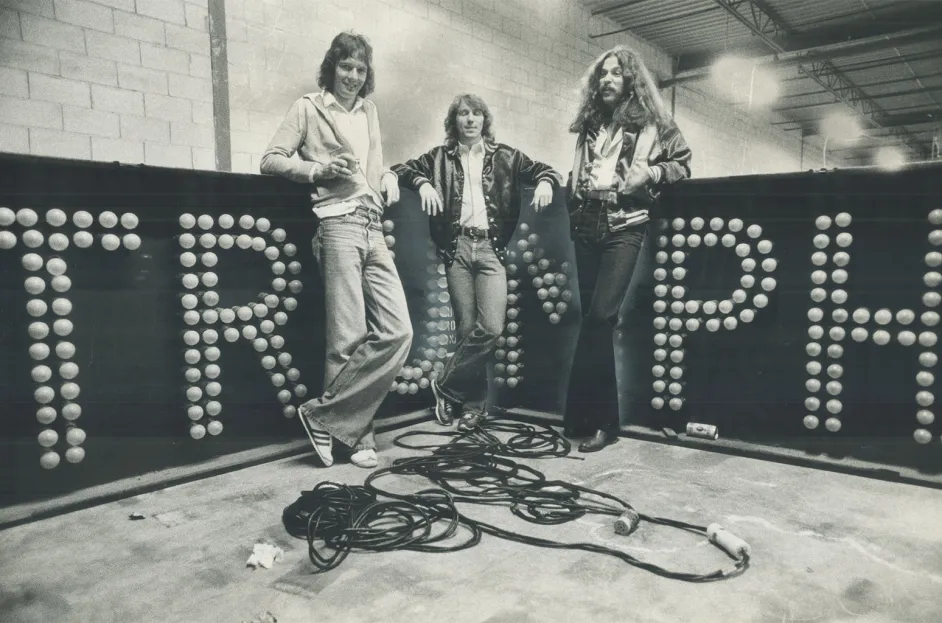Triumph, the allied forces of rock: Retrospective of a superb and ephemeral career (1976-1993)
The legacy of Canadian band Triumph remains as important as the band itself was at the time.

It was 1975 when four Canadian musicians formed Abernathy Shagnaster, a blues project made up at that time of Fred Keeler on guitar, Peter Young on organ, Mike Levine on bass and Gil Moore on vocals and drums. Shortly after their formation they signed with Attic Records and released their first single: Hobo and Got To Get You Back In My Life. The moderate success of their first work and the disinterest of two of its members, Keeler and Young, led them to leave the ranks of Abernathy Shagnaster, leaving only Moore and Levine as members of the project that died shortly after that same year.
That same year, Moore and Levine met Rik Emmett at the Hollywood Tavern in Toronto during a performance with his band ACT III. The two musicians contacted Emmett and, after a jam session at Moore‘s house, the guitarist agreed to be part of his new project, which would be called Triumph. With the formation ready, the band begins to compose material as a trio and they put aside the blues to dedicate themselves to a more mature rock with blues overtones. The band’s first concert as a trio in 1975 was at Simcoe High School.
Triumph started working on their self-titled debut album combining elements of classical music and progressive rock, elements that Emmett himself would bring to the trio at the time he joined the band. In October 1976, maintaining their contact at Attic Records, they released their debut album, Triumph, an album characterized by unifying hard rock and progressive rock in a perfect combination in which both Moore and Emmett shared the vocal and the composition of the songs. The moderate success of their debut led them to tour their native country throughout that year presenting their debut offering up to sixty-two dates throughout Canada, a very high number for a band that had just started. Triumph (1976, Attic Records) would be reissued in 1995 on CD format and would then be entitled In The Beginning.
With a good reputation behind them, Triumph decided to invest the entire year 1977 in the production and recording of their second album, Rock & Roll Machine, a more mature and worked album with which they managed to gain a foothold on the world scene. thanks to the album’s title track and a cover of Joe Walsh‘s Rocky Mountain Way. Before the release of their second full-length album, Triumph attended a program in San Antonio (Texas) to promote the album and then participated in several concerts organized by JAM Productions, a company in charge of producing tunes and other television advertisements founded in 1974 by Jonathan M. Wolfer. Shortly afterward they go on tour in their native country with Moxy and Trooper, two local bands.

Rock & Roll Machine (Attic/RCA Records) was released in November of 1977 and and Triumph embarked on its first US tour the following month which lasted until October 1979, where it won over the public thanks to its energetic staging. Triumph began to work on their third full-length Just A Game during the tour presenting Rock & Roll Machine, whose third album would be released in January 1979 through Attic Records and which, like its predecessor, was distributed in America by RCA.
Just A Game was a huge success and it quickly placed itself on the American charts thanks to its single Hold On, reaching number 38 on the Billboard Hot 100. Although the success of Hold On was quite moderately, Triumph broke with everything shortly after by releasing Lay It On The Line as a single, a song that would not reach that high on the charts but would be played regularly on classic rock-oriented radio stations in America and Canada. Over the years they would be certified gold in the United States for Just A Game.
A year after the release of previous album they returned to the charts with the release of their fourth studio album Progressions Of Power (Attic Records, RCA) which was released in March 1980. The release of their single I Can Survive would not rank as well as Lay It On The Line in the American charts but they manage to reach position 59 in the United Kingdom charts thanks to I Live For The Weekend and the band would enjoy great popularity during that decade. The band expanded their range on this album and incorporated some heavy metal elements, a characteristic that would define their future releases and that would bring them closer to a younger audience.
Triumph left the American continent for the first time at the end of 1980 to present Progressions Of Power in the United Kingdom, offering up to nine dates in British territory in one of its few visits to non-American territory in its history. Such was the success obtained up to that point in their mere four years of life that they managed to release their energetic proposal in legendary venues such as the Hammersmith Odeon, the Apollo Theater or the Manchester Apollo.
With their batteries fully charged, they decided to lock themselves in the Metalwork Studios in Mississauga (Ontario) to work on their fifth studio album. Triumph invested a little more time in the composition of their new album and, therefore, Allied Forces would not see the light of day until September 1981, a year and a half after Progressions Of Power. They approached more to heavy metal with Allied Forces and ended up offering a very well-crafted album with which they position themselves even higher on the charts.
The single Magic Power would be the most successful from the album, reaching the eighth position of the most played songs on the Mainstream Rock Chart. Fight The Good Fight and Say Goodbye also managed to sneak into the Mainstream Rock Chart but with less success, reaching positions 18 and 50 respectively. That same year they would offer a show at the Heavy Metal Holocaust festival in the United Kingdom and visit Puerto Rico for the first time in their career, a territory to which they would return sporadically in the coming years.
Although Triumph is unknown to many of the current followers of the genre, the Canadian trio marked a before and after in the history of hard rock thanks to their proposal in which they combined both the most commercial rock and blues, hard rock and even heavy metal, thus achieving cult status within that world, especially during the eighties and early nineties. The rapport of Moore, Levine and Emmett gave rise to one of the most important bands of that decade that knew how to assume its role in the history of music, advancing by leaps and bounds with each release and knowing how to adapt to new times year after year. staying true to your instinct at all times.
The relationship between the members may have led to their own destruction a few years after their formation. The band went on to make history in the barely twelve years that they remained together, a history that they forged based on enthusiasm, passion and a lot of practice. That in less than four years they were already sharing the bill at a festival like Heavy Metal Holocaust alongside Motörhead, Ozzy Osbourne and Frank Marino says a lot about those three kids who had gotten together a few years ago when a band like Abernathy Shagnaster had no major impact on music is something that cannot be attributed to any band from that time.

In addition to her passion for music, Triumph is known for her social actions and her collaboration with a multitude of charitable and solidarity organizations throughout her career, both during her period of musical activity and after her separation. Triumph‘s largest charitable contribution was its final appearance at Maple Leaf Gardens in Toronto, on January 22, 1987, which was hosted by Gary Slaight for the United Way of Canada, Greater Toronto Division’s Sounds United campaign whose profits amounted to 179,356.66 dollars, which were donated entirely to said campaign.
They currently maintain a Signed Guitars program with which they have raised more than $250,000, which they have donated to various charities through the sale of more than 100 Fender guitars signed by the band since 2009. Rik Emmett himself has individually contributed guitars to Kids With Cancer, CNIB Ride For Sight and Barrett House Aids Hospice. Likewise, the band donated their music and their entire history in 2011 to the University of Toronto.
With five successful studio albums behind them and a legion of fans behind them, the next step for the Canadianswas to record a new album to stay on the charts until their next adventure in the studio. The band decided to entrust the production work to the same producer who had already worked on the previous release, David Thoener, a young and restless producer who had debuted in his profession the previous year and who, without a doubt, was one of those in charge of giving that characteristic sound to the trio in Allied Forces.
Triumph‘s work for his new album had to be far superior to that of its predecessor, which debuted on the sales charts in thirteenth position and was a resounding sales success that further strengthened his short career until then. This is how they entered Metalwork Studios again, founded in 1978 by Gil Moore himself to give life to their sixth studio album, a new installment of their then-established hard rock and less heavy metal. Never Surrender was released in 1982 through Attic but was not distributed outside of Canada until January of the following year. The success of this new work was somewhat more moderate than Allied Forces, debuting at position #29 on the sales charts – sixteen positions below its predecessor – and with less recognition. Never Surrender stood as a new banner within their career, further stabilizing their sound and following a different path than the one they had started with their previous release, an element that helped them get their singles on the air from time to time but with a much more moderate rotation than other hit singles like Lay It On The Line or Hold On.
Perhaps the biggest problem with Never Surrender was the simple fact of succeeding an excellent album as Allied Forces, his most charismatic and beloved work for many of his followers and one of the fundamental pillars of 80s rock for the one who writes these lines. Having to pick up the baton of such a powerful album and move forward with a new release such as Never Surrender set the bar so high that the expectations generated could only end in praise or disappointment, with no middle ground. Rolling Stone magazine even rated the album with one star, claiming that it was a terrible album and destroying all the work that the trio had dedicated to the composition and creation of their sixth studio album, an unfairly valued album that unfortunately does not arrive at the levels of its previous release but that stands on its own with a notable final finish that opened the doors of a new horizon for Moore, Emmett and Levine.

Be that as it may, the trio knew how to face the criticism of their sixth album and grew exponentially in their next release. Triumph took a short time to compose its seventh album in its entirety, the lastest release composed solely of the three members of the band, and Triumph returned to Metalwork Studios in April 1984 to give life to Thunder Seven. The recording of their seventh release took its time, which is why the band only offered one concert in May of that year at the American Rock Festival as part of the Never Surrender presentation tour and later returned to the studio to continue working on his new album until November of that same year.
Thunder Seven finally saw the light of day in November 1984, with a week of difference between the release in the American and European markets, and recovered part of the heavier sound of Allied Forces. It wouldn’t be an album comparable to the aforementioned, far from it, but the important part was the simple fact that the band had managed to overcome the obstacles that were presented to them with the release of Never Surrender and the unfavorable reviews to turn them into his allies and counterattack with a renewed Thunder Seven.
Looking back I still think that it is not Allied Forces but perhaps time and the moment did not treat well this seventh album that many people classify as a minor release and, for my taste, it could be quite equal with Allied Forces . Let it be noted that their fifth album seems to me to be the best album of their entire career and that I idolize the band’s Allied Forces album, but I believe that the trio’s career has been unfairly treated by the community after the release of that album that led them to the highest.
Their seventh album would go on to be certified gold in the United States over the years, but neither of its two advances had much impact on the American and British charts. The devastating Spellbound did not even make it into the Billboard top 100, while Follow Your Heart was the only one of the two advances that rose a little higher on the charts and reached #88 on the Billboard charts, a figure very far from his previous singles.
Criticism was not as harsh with this new album, but although the album had a more successful reception, it never enjoyed great popularity and is still considered a minor work in his post-Allied Forces discography. The passage of time, the general disinterest of the public and the demands of critics took their toll on the band and, consequently, had a great impact on subsequent releases.
The Sport Of Kings was the album that had to put things in place or the one that would completely destroy the lineup. The band had reached the top in a very short period of time and just as that success had placed them at the top, their status declined at the same speed in a matter of four years. The band then decides to change the sound of their music radically and jumps on the bandwagon of melodic hard rock, completely abandoning the heavy metal of their previous releases. Perhaps it was not the most appropriate path, although at that complicated moment not even they themselves knew how things would end. The band was reaching a sour moment that would take each of them to the extreme and I don’t think it was the right time to think about what was going to be best for the future of the band.
Much of that concern was finally reflected in the release of The Sport Of Kings which alternated recording between Metalwork Studios in Canada and One On One in California. September 1986 was the month chosen for their eighth album to be released through MCA, which had already released Thunder Seven and the live album Stages in 1985, and although the single Somebody’s Out There was quite successful, the album was battered by critics and by Rik Emmett himself.
Apparently Emmett wanted to record The Sport Of Kings at the L2K studios in Mallorca but both Gil and Moore wanted to continue recording in their own studio and finish the finishing touches at One On One in Hollywood, and that is one of the main reasons for which Emmett has expressed on several occasions that he does not like this album at all. The sound was somewhat more commercial, the use of keyboards and synthesizers was included, resulting in an album with less personality but full of quality. And no Triumph album can be denied the level of quality it presents, from its debut to the marginalized Edge Of Excess.
While The Sport Of Kings may seem like a minor album next to their previous releases, few can say that songs like Tears In The Rain, Just One Night or the aforementioned Somebody’s Out There should not be part of it from any live band repertoire. In fact, it seems unfair to me that both Somebody’s Out There and Tears In The Rain are present on several compilation albums or in their live performance A Night Of Triumph from 1987 and that Just One Night was never performed live. In fact, it was Eric Martin from Mr. Big who was the only one brave enough to perform it once live in San Rafael (2010) when not even its own original composers had decided to arrange it for the live shows.
At that time the aforementioned live show A Night Of Triumph was filmed, a live show recorded during the presentation tour of The Sport Of Kings at the Halifax Metro Center – currently Scotiabanc Center – in Nova Scotia (Canada) and presents one of their most successful live shows that was released in home format (VHS and Laserdisc) in 1990 and was later re-released on DVD in 2004 under the band’s own label, TML Entertainment.
The keyboardist Rick Santers was signed for the The Sport Of King” tour, known for his work as a composer and leader of the Santers project with his brother Mark, this allowed them to tour with Yngwie Malmsteen in the United States. Once the tour was over, Moore and Levine decide to get to work on their new album with the sole objective of returning to their roots, staying firm in the blues-rock that gave life to Triumph‘s first releases, but Emmett wanted to continue exploring and expanding horizons, bringing with him certain elements and leaving aside the first years of his career. That is why Emmett provides the collaboration of Dixie Dregs and Steve Morse, guitarist from Kansas, for his new release, which would be his last album with Triumph.
Surveillance, the ninth album of their career, was recorded again at Metalwork Studios between February and July 1987, which was finally released on July 27, 1987 as the band’s fourth release on MCA. The production of the album was handled by Thom Trumbo, an unknown producer who had only worked on Triumph‘s previous release, had produced All I Wanted by Kansas, and went on to produce a Pink Floyd compilation album in 1993, Works, and was in charge of the recording and production of a couple of Melvin James albums at that time. Their work, much more consistent in this second release by the Canadians, gave their music a great strength and atmosphere that surrounds the entire album, but unfortunately it did not have the expected success and the band became even more discouraged.
The release of Surveillance was a hard blow for the band at the time. Although it is now considered one of their most intrepid and risky works and has earned its place in the band’s history, at the time it was a release that was received with mediocrity among specialized critics and did not achieve the desired success. Three promotional singles were released, Let The Light (Shine On Me), Long Time Gone and Never Say Never, but the only one to achieve any success on Canadian radio stations was the first of the aforementioned, while Never Say Never didn’t even make it onto the charts in its native country.
Surveillance moved even further away from the proposal of their previous release, bordering on AOR in some songs, although in a way they knew how to return to their roots. Songs like the aforementioned Never Say Never or the masterful Headed For Nowhere brought back that good taste for guitar playing and catchy rhythms while other songs like Carry On The Flame or Let The Light (Shine On Me) went in a completely opposite direction, intended for a broader and less demanding audience, bordering on the compositions of hard rock bands of the time.
Internal problems played an important role in the band and in 1988 the need to separate their paths became evident due to pressure, musical differences between Levine, Moore and Emmett or the band’s own artistic direction. September 3, 1988 was Triumph‘s last concert with Emmett in their ranks before abandoning the trio to dedicate himself to his solo project, at which point the original lineup would break up to make way for the helpless Moore and Levine who would move on with the legacy of his project after signing Phil-X, who until then had been part of two successful Canadian bands such as Frozen Ghost and Aldo Nova.
Five years had to pass between Surveillance and Edge Of Excess, enough time for Levine and Moore to have the necessary freedom to compose an album according to their vision of the project after Emmett‘s departure. With Phil-X in their ranks they had a guitarist of Emmett‘s stature, bridging the gap, capable of delivering authentic hard rock, what Moore and Levine had been seeking to do since Thunder Seven. This is how Edge Of Excess was finally born in 1992, which like their previous releases was recorded at Metalwork Studios and was produced by Levine and Noel Golden. The third installment of Clive Barker’s Hellraiser saga, titled Hellraiser III: Hell On Earth, made use of Troublemaker on its soundtrack, one of the most successful songs on the album.
Triumph‘s tenth studio album, the last of their career to date, was received with enthusiasm but did not enjoy popularity. The criticism did not help the band to re-emerge and, despite delivering a notable album, some problems with the record company forced them to dissolve the project in 1993. Triumph was able to finish the tour to present Edge Of Excess, with Phil-X on guitar and Rick Santers on keyboard and as Emmett‘s substitute on vocals in the songs he sang, but unfortunately he was forced to cease her activity after these unfortunate setbacks. Thus he ended a career of successes and disappointments, leaving behind a legendary legacy that to this day remains unbreakable like the rest of his work.

The band met in 2007 as guests of honor in the Canadian Hall Of Fame after having been recognized as one of the most important bands in the entire country, at which time its members denied the reunion plans because each of its members He was focused on his own projects. The following year they confirmed their presence at the Sweden Rock festival as one of the biggest surprises of that year and it was the only date in which the original lineup played in full again, resulting in the release of the live album Live At Sweden Rock which was released by Frontiers Records in 2012. They recently reunited at Metalwork Studios to re-record three songs that will appear in the biographical documentary about their career, When The Lights Go Down, Lay It On The Line and Magic Power. The documentary directed by Sam Dunn was titled Lay It On The Line and distributed by Banger Films.
“It makes her feel much better, brings her closer to her dreams. A little magic power makes it better that it seems.”




![amorphis-presentan-nuevo-sencillo-light-and-shadow-de-nuevo-album-borderland-1849[1]](https://alliedforces.es/wp-content/uploads/2025/08/amorphis-presentan-nuevo-sencillo-light-and-shadow-de-nuevo-album-borderland-18491-300x159.jpg)



